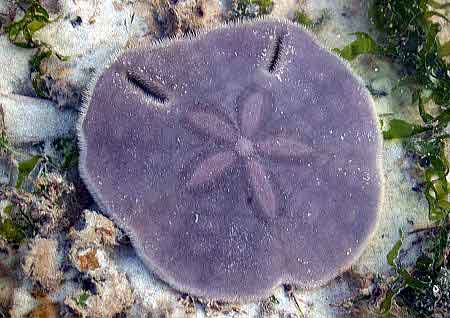
The Sand Dollars are spiny, hard-skinned animals, shaped like coins. There are many different species of sand dollars. They live on the sandy sea floor.
Most sand dollars are found at depths of 30- 40 feet. Sand dollars partly bury themselves under the sand, with an edge poking up out of the sand. You can often find the dead “shell” of a sand dollar, called a “test” washed up on sandy beaches. If you break open a test, there are many hard, loose, white pieces; these were the teeth of the Sand Dollar.
Sand Dollars are related to sea urchins and sea stars. Their tiny larvae (baby Sand Dollars) travel many miles as they are swept along by ocean currents.
Anatomy: Sand Dollars have 5-part radial symmetry. These invertabrates have ard skin made of calcium carbonate plates. The bottom surface contains the mouth, many black spines (which trap food), and the cilia (small hairs) that help direct food into the mouth. Sand Dollars have tiny tube feet that are used as gills. The holes on the top surface are where the eggs and sperm are released.
Diet: Sand Dollars eat tiny particles of food that float in the water.
Predators: Sand Dollars are eaten by sea stars, starfish, snails and skates.

So awesome
why are they white on land but not in water?
Thanks for your marvelous posts! I seriously enjoy reading them, you are a great author.
I will remember to bookmark your blog and will be back. I want to encourage you to continue your great work, have a nice day!